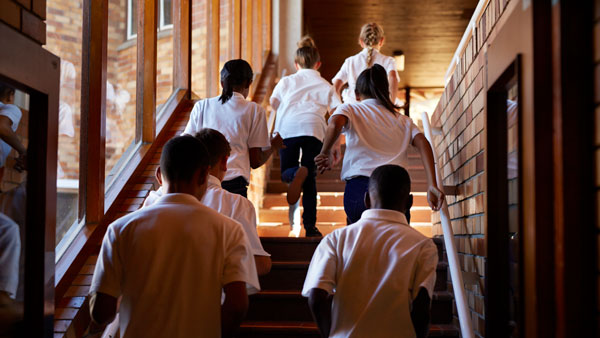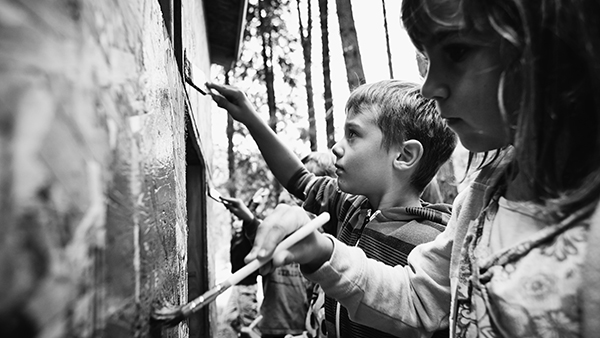A revised and decolonised history curriculum is long overdue but what is required at a systems level to allow schools and other places of education to be inclusive? Senior Programme Manager, Milla Nakkeeran, explores the opportunities and benefits of greater inclusion within the curriculum and how inclusivity beyond it could help tackle racism within education.
In March of this year, the government released Inclusive Britain - its response to the Commission on Race and Ethnic Disparities. Inclusive Britain sets out a range of measures to translate the report’s findings into forward actions across government. With regards to schools, the Department for Education has committed to some specific actions over the next two years designed to create a more inclusive history curriculum by:
- Working with experts, historians and school leaders to develop a knowledge-rich model history curriculum by 2024 that will help students understand the intertwined nature of British and global history.
- Signposting resources for schools to support all-year round teaching of black history in readiness for Black History Month.
- Introducing transformative teacher training reforms equipping them to make ethical decisions in curriculum design and leadership.
Equalities Minister, Kemi Badenoch, has subsequently commented on these plans with the need to teach both the positives and negatives of the British Empire in a more nuanced approach to history. This has been further endorsed by Education Secretary, Nadhim Zahawi’s, similar comments about the importance of students being taught the ’benefits’ of empire. But how helpful are such comments, and Inclusive Britain, in supporting schools to be more inclusive?
A difficult history
History curriculum reform has previously proved contentious. Over a decade ago, Michael Gove’s reforms, which championed a whiggish interpretation of Britain’s past in isolation from the rest of the world, were met with widespread opposition from academics and teaching professionals. This move away from a Govian approach to history will be welcomed by many keen to see a curriculum which embraces the diversity of British history, contextualises it globally and enables all students to experience a sense of belonging and inclusion. Reform feels much overdue when, in 2019, 70% of people surveyed in a YouGov Poll believed that historical injustice, colonialism and the role of the British Empire should be taught as part of the national curriculum.
An inclusive history curriculum empowers students to think critically and analytically about the past for themselves in a way that is meaningful to them.
While a more inclusive history curriculum is much needed, an interpretation of Britain’s colonial past that encourages students to understand the ’benefits’ of empire alongside its negatives, is problematic at best. Furthermore, teaching colonial history solely through a ’knowledge-rich’ lens of pros and cons to be debated, misses the purpose of an inclusive history curriculum. It’s not about stopping people from wanting to pull down statues, as Schools Minister Robin Walker has suggested, it’s about empowering students to think critically and analytically about the past for themselves in a way that is meaningful to them. The curriculum should develop students’ historiographical capabilities, their agency to write histories for themselves, and strengthen their sense of belonging to their community. But supporting schools to be more inclusive goes beyond a history curriculum that addresses Britain’s colonial past. And it isn’t simply the content of the history curriculum that is exclusionary.
Inclusivity and a sense of belonging
Our current work around preventing school exclusions is examining how the curriculum itself excludes many students who are often prevented from accessing certain subjects and lessons. This can have a detrimental impact on students’ sense of belonging within the school community and subsequently their engagement with learning as a whole. Combined with exclusionary school cultures, this has a disproportionate impact on students from certain ethnic minority groups. These are systemic issues, which is why our work in this area is fostering greater multi-agency collaboration between schools and local services; to make local education systems more inclusive.
Beyond the curriculum, teachers and school staff play an important role in creating inclusive spaces for students, and schools should likewise be inclusive places for the staff that work there. Our Pinball Kids report encourages schools to consider how they actively promote diversity in their workplace – research has shown the importance of reviewing diversity data, using language in personal specifications that do not discourage applicants with certain characteristics to apply and also the range of peer support networks that can help schools to connect with teachers from underrepresented groups. Headteacher Paul Mundy-Castle has spoken out about how the systemic racism he experienced impeded his career progression within education. If we want to make schools truly inclusive it is imperative that teachers from underrepresented groups are not being discriminated against and that the staff body represents the diversity of the student population, at all levels of seniority.
The third benefit
Teachers also need support and training to feel confident in ethical decision making, as suggested by the Inclusive Britain response, but also to enable students to develop their own agency in this area. In our Social Action in Primary Schools project, teachers played an important role in supporting students to navigate ethical challenges and found that by trusting and empowering students to lead social action projects, they could become socially responsible citizens. Our Citizens of now report highlighted how primary students in some schools chose to address issues of racial inequality through youth social action. For example, students at Woodrow First School chose to fundraise for Show Racism the Red Card and created their own spoken word film to raise awareness about racism. From 6 June 2022, the project will be entering a new phase which will explore the potential ’third benefit’ to teachers of high-quality youth social action; conceivably related to developing confidence in teaching sensitive and controversial social issues.
Design thinking
Our Pupil Design Awards, which encourages students to use design thinking to engage with real-world problems, last year tasked secondary students with the brief: “How might we challenge systemic racism by redefining heritage to ensure that future generations engage with a more inclusive story of our past?” Winners of the awards focused on local community campaigns which celebrated the roles of Black and Asian soldiers in the second world war, as well as designing interactive display boxes aimed at raising cultural awareness in school. Through this project, it has been highlighted that young people possess the creativity, imagination and self-efficacy to design potential solutions to the challenges that systemic racism poses.
Inclusive learning environments
Our Inclusive and nurturing schools toolkit also highlights areas of innovative practice in schools that are actively promoting inclusive learning environments. The trauma-informed approach taken by Kingsford Community School in Newham views racial trauma as a mental health issue. The school has been involved in developing a programme for all members of the school community which trains teachers to be anti-racist educators and facilitates students to recognise and understand racial trauma and the impact it can have on mental health, wellbeing and behaviour. Another school, Surrey Square Primary, provides whole-family pastoral support with issues such as immigration and poverty through a dedicated family and community worker, recognising the unmet basic foundational needs of many students which prevent them from accessing learning and the curriculum. A whole-school approach to anti-racism is therefore required, and resources such as the Anti-racism charter and framework from the National Education Union provide schools with useful tools for making positive changes towards this end.
We have also seen, not least in the Local Child Safeguarding Practice Review of Child Q, which found that racism was likely to have been a factor in the decisions made by professionals, that change needs to happen at an institutional level beyond schools. Local authority safeguarding partnerships need to ensure they are supporting the eradication of racism, discrimination and injustice across its local safeguarding arrangements. Equally, law and policy, need to ensure local practices do not criminalise and cause harm to children.
In conclusion, while an appropriately revised and ‘decolonised’ history curriculum is very much needed, this barely scratches the surface of what needs to happen at a systems level to truly enable schools to be the inclusive places they should be.
What are the other tangible benefits of a more inclusive history curriculum? Do you know of a school or academy network that is already implementing progressive changes to history lessons? Continue the conversation in the comments below and by joining our event, Dismantling racism in British education, on Thursday 9 June at 1 PM. Click below to register.

Dismantling racism in British education
Jeffrey Boakye discusses the challenges of navigating a system of learning that has been designed white as default.
Related projects and reports
-
Preventing School Exclusions
Find out more about the RSA's work to make local education systems more inclusive and reduce preventable exclusions.
-
Pinball Kids: preventing school exclusions
Report
Laura Partridge Fran Landreth Strong Elinor Lobley Danielle Mason
What’s causing the rise in school exclusions and how to fix it.
-
Primary Youth Social Action
Can we extend the positive impact of volunteering to primary schools?




Join the discussion
Comments
Please login to post a comment or reply
Don't have an account? Click here to register.
What are the key ideas that encapsulate the historical progression of Europes' and the UKs' political thought and actions? In order to function effectively within Europe, it helps to understand how, and why, it works the way it does. Starting from where we are provides a foundational location for a critical appraisal of both our own and other political modes of organisation, it also provides the student with a shared understanding of their current place within the world. This is not a matter of race, but a matter of survival in a competitive and technologically advanced society. All societies require that you have some knowledge of both the formal and informal rules that people live by in those societies as a means of survival. Are the concerns that the key political philosophies address solely of one race? What are the common political and ethical concerns that unite all races and how have they been addressed by different cultures across the world? How has geography and climate affected the way that communities organise themselves? What has been the impact of technology upon the way that communities have chosen to organise themselves since the Enlightenment? Can we learn anything from other cultures that would improve the way in which we organise our societies? Can you separate religion from politics? What has been the impact of different belief/faith systems on the type of political organisation in the communities that they exist within? What are the supra-national organisations that affect the national and local political decisions that are made and how are they constructed? Ect.
Racisim is only a small secition of DISCRIMINATION. This is an action, which is started withe the words of a parent : "Be careful with that child from 3 houses down." or "Do not play with.... !" Anything esle is just being more specific in limiting the Discrimination. Discrimination basically states: "" I am better than you ! "" Denying the other person to BE counted as a human being. That is what has to be spoken of.
I think this area needs to go right the way back to the earliest empires and the earliest forms of imperialist thinking. The Vkings were involved in the slave trade, as were North Africans and many others long before them - and after them. That could only happen as a result of the dehumanisation of their victims. The same was true when the Normans and Anglo-Normans invaded and occupied Ireland and considered the native Irish to be sub-humans, as European slave traders considered Africans in the same way in later centuries. Ideological supremacy and supremacists who benefit financially from subjugation of others are the real cause of the problem.. What needs to be taught in schools is the dangers of all supremacist ideologies which can affect ALL human beings. It inevitably leads to ethnic cleansing and genocide on a mass scale if it is not challenged and eliminated. Everyone knows about the holocaust in Nazi Germany but how many know about the holocaust in Namibia before it?
A refreshing new blog - not least because, for the first time I remember from the RSA, it links in a whole range of Society activities, drawing out how they overlap and potentially interlink. I have been critical for some time of the 'silo' like attitude that has tended to prevail in the RSA which this does so much to break down. I am not an expert on History in the curriculum but I started to be alarmed at the number of references to and reports on unfolding government attitudes - probably the least valuable source for progress in schooling - but I was soon heartened by a short but powerful critique which, importantly, referred to historiography as a shorthand for kids creating history, learning how history is created and perhaps gaining some insight into whose history prevails and why.